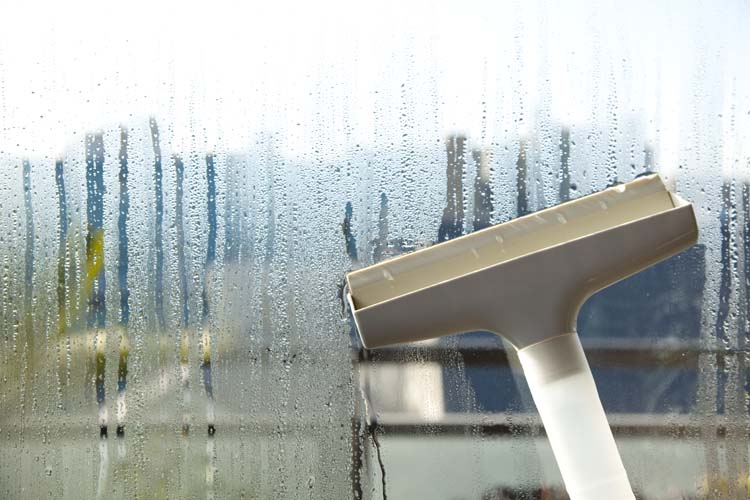
We often think that condensation on aluminium windows results from manufacturing defects of the window or inferior installation.
In reality, no double or triple glazed energy efficient windows will 100% eliminate condensation, whether you have uPVC or aluminium frames.
Double and triple glazing help keep the glass’s surface temperature warmer and reduce window condensation. Glass is generally one of the coldest materials, attracting condensation. This isn’t to say that condensation only occurs on glass.
Moisture will condense on other cool surfaces; modern aluminium windows with a polyamide thermal break can be susceptible to condensation, as the inner frame no longer transmits heat to the outer frame, making its surface temperature colder.
Glass units are denser and the least porous material, so they are the most visible material in the home to show condensation first.
In this article, we’ll look at what causes condensation on aluminium window frames and panes of glass and provide tips on how to prevent it.
Condensation, also known as window sweating, occurs when warm, moist air comes into contact with a cold surface.
The warm air inside your home meets the cold surface of the window, causing the moisture in the air to turn into water vapour on the window pane.
Humidity level, combined with air temperature, defines a temperature at which condensation will form, also known as the dew point.
This is common on aluminium windows, especially during the colder months.
There are a few factors that can contribute to condensation on aluminium windows:
Excessive humidity levels in your home are more likely to increase condensation on your windows. Humidity levels can rise due to cooking, showering, and even breathing. Ventilation is generally the most effective way to decrease humidity and can be done by opening windows and doors.
Proper air circulation is essential in preventing condensation on aluminium windows. If the air in your home is not adequately ventilated, it becomes stagnant, increasing humidity levels and condensation on your windows.
This is why it’s essential to have proper ventilation in your home, such as trickle vents or extractor fans, especially in rooms where moisture is more likely to occur, such as bathrooms and kitchens. This can help create a dryer atmosphere and prevent condensation on aluminium windows.
Now that we understand what causes condensation on aluminium windows, let’s explore some tips for preventing it.
A dehumidifier is one of the most effective ways to reduce humidity levels in your home. These devices prevent condensation on your windows by eliminating excess moisture from the air. Place a dehumidifier where moisture is most likely to accumulate, such as in the kitchen, bathroom, and laundry room.
As mentioned earlier, proper air circulation prevents condensation on aluminium windows. To increase air circulation, open windows and doors when possible and use extractor fans in areas where moisture is more likely to accumulate. A ceiling fan is another way to help circulate air throughout your home.
Fluctuations in temperature can contribute to condensation on aluminium windows. To prevent this, keep your home at a consistent temperature throughout the day. This will help to reduce the temperature difference between the warm air inside and the cold surface of the window.
If you notice condensation on your aluminium windows, wipe it down with a soft cloth or paper towel as soon as possible is essential to prevent causing damage to your window frames. If leftover time, this can lead to mould and health problems.
Window ventilation systems, such as trickle vents, can help to reduce condensation on aluminium windows. These vents allow a controlled amount of air to enter and exit your home, helping maintain proper air circulation and reduce humidity levels.
Regular window maintenance is essential in preventing condensation on aluminium windows. Here are a few maintenance tips to keep in mind:
Debris and dirt can trap moisture and contribute to condensation on your windows. Regularly cleaning your windows can help to prevent this. To clean the glass, use a mild detergent and warm water. Dry it off with a soft cloth, too.
Leaks around your windows can lead to moisture buildup and contribute to condensation. Check for cracks or gaps around your windows and seal them with caulk or silicone.
Over time, window frames can become damaged or warped, leading to gaps and cracks that allow moisture to enter. Inspect your window frames regularly and repair or replace any damaged areas.
Condensation on aluminium windows can be a frustrating problem for homeowners, but it’s not something that can’t be prevented. Following the tips mentioned in this article and properly maintaining your windows can reduce the likelihood of condensation and keep your windows looking clear and clean. Remember to keep your home well-ventilated, use a dehumidifier, and consider investing in the ventilation system. With these tips, you can enjoy clear, condensation-free windows all year round.
Read our previous post - « Should I Choose Double Or Triple Glazed Windows For My Hampshire Home?